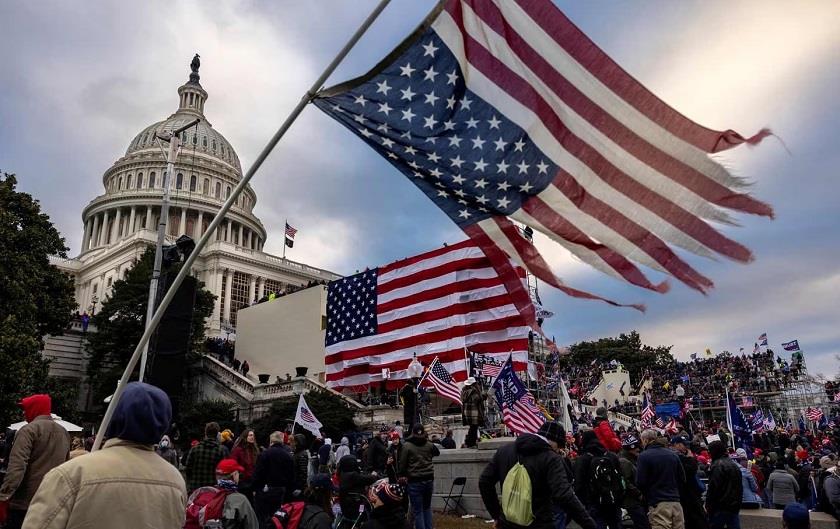
Do Iran Attacks Signal The End Of American Hegemony?
The Capitol insurrection on January 6, 2021. Photo credits: Brent Stirton / Getty Images
Israel has just concluded its 'attacks' on Iran. These, at this point in time, appear to be more symbolic than substantive- perhaps in the nature of demonstrating to Israelis the country's ability to retaliate. This is not to say that Israel could not have made a compellingly powerful attack on Iran. With western powers having its back, and with massive arms sales and transfers to the country and the presence of thousands of marines in the Gulf, Israel's response would have been more dangerous. But this does not mean that Iran would be a push-over: despite crippling sanctions, attritional wars and double containment, Iran is neither Costa Rica nor Bhutan, for example. Above all, the will to resist is ingrained in the DNA of Iranians.
What then explains Israel's rather tepid retaliation?
More than the flurry of diplomacy that involved America's mediocre Defense Secretary Lloyd Austen and less than worthy Secretary of state, Anthony Blinken, two factors would have focused Americans' minds: the state of the global economy with high oil prices running amok post an attack and, two, the Middle East getting engulfed into a wider and deeper regional conflagration. Neither, to state the obvious, are in America's interests. Damage to the global economy would affect America's economy which doing very well. An economic downturn induced by war in the Middle East would percolate back to the US. Neither the democratic party nor the Republican party presidential hopefuls would want that- nor presumably the US' deep state. A wider and a deeper conflagration would carry obvious and insidious perils in the region and beyond. Importantly, all this would have happened when China is making noises about Taiwan, North Korea is sending troops to Russia against delivery of sophisticated delivery systems and arms, the war in and over Ukraine is going badly for the West, and the global South is reconsidering the nature of its ties with the West. Added up, an Israeli attack would have bogged the US in a war (not of its choice) contra its military force posture and doctrine: ability to fight a two-front war. America, the declining hegemon, would be like Gulliver chained and maneuvered into a condition from where exit in the expansive sense of word would be well-nigh impossible.
ADVERTISEMENTMultiple wars on multiple fronts would drain and sap America, its power and prestige. All this explains America leaning on Israel and mute its 'retaliation'. In a convoluted way, what is happening is classic balance of power politics where the hegemon of the day is being 'balanced' by its rivals and competitors- albeit in a militarized idiom. Stretching the argument further, American strategists are keenly aware of 'imperial overstretch' and its perils for America itself. But delineating these themes and factors is to state the obvious. The real and lasting damage is to the substance of international relations. While force and power are the foundational elements of international politics, but post 1945, norms were devised to hedge and hem the use of force in the interstate system. This normative consensus stands broken (perhaps irretrievably so) after Israel's assault on Gaza, Lebanon and its potential pre-emptive strikes on Iran. In the nature of an extremely toxic and dangerous development, it makes war kosher (or halal as the case may be) for anyone and everyone in the international state system. Countries paired in a dyadic conflict with each other now have no inhibitions to go to war against each other. (Even nuclear war can be on the anvil now).
There are two other casualties post October 7, 2023: international law and soft power. The repository of both was the European Union- a union that happened through 'widening' and 'deepening' by virtue of the 'clubs' soft power and normative emphasis on international law. Now even the Europeans (even flaccid Germany) is considering re-militarizing itself.
While soft power, in practice, was rhetorical gloss over America's hard power but conceptually there was something to it.
But even conceptually it is dead.
The world that we now inhabit is then a dangerous, polarized world with war returning as the practice to determine power relations and the solvent of conflicts. It is as alarming as can be.
The onus for creating this world can be traced to America -within its wars of choice in Iraq and Afghanistan, its untrammeled focus on free market capitalism and its concomitant untrammeled globalization, overall hubris and concentration of power in the country. Is there a way out- a redemptive one? While much depends on the 'escalatory- de-escalatory' dynamic in the Middle East and how it pans out (whether Iran will counter attack and how this will denoue), the ultimate antidote to war and crafting of peace in the region and beyond may lie in a multi-polar world- the kind that would check the worst impulses of a reckless and irresponsible hegemon (read America) and lead to peace within and without. The process and path toward robust multi-polarity has begun. It's time to nudge it further.

Legal Disclaimer:
MENAFN provides the
information “as is” without warranty of any kind. We do not accept
any responsibility or liability for the accuracy, content, images,
videos, licenses, completeness, legality, or reliability of the information
contained in this article. If you have any complaints or copyright
issues related to this article, kindly contact the provider above.


















Comments
No comment